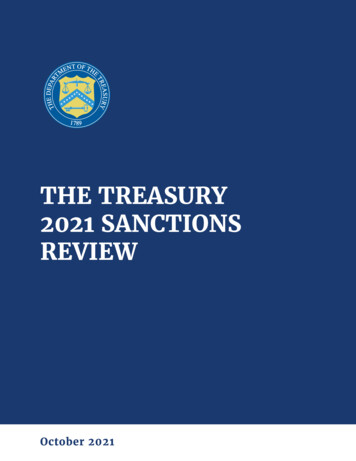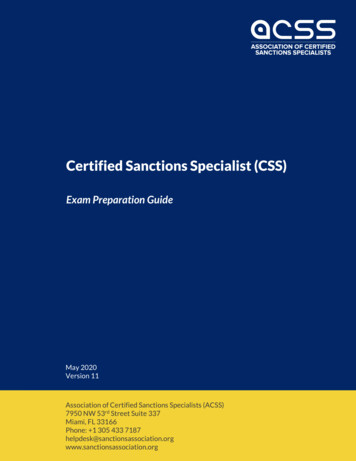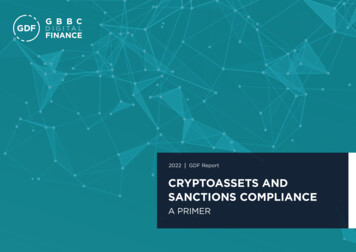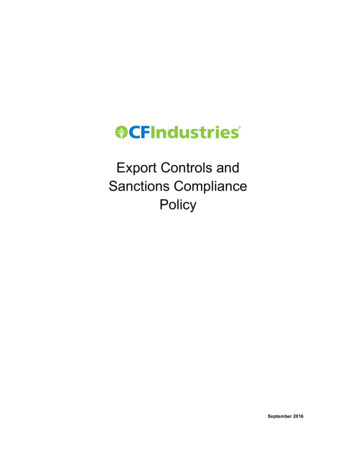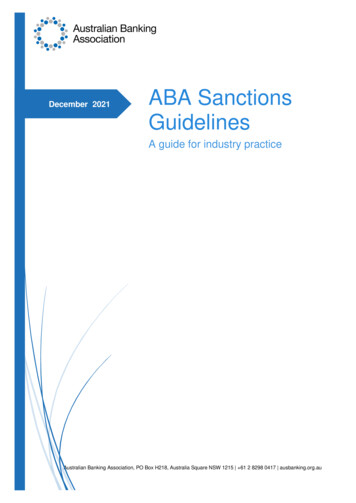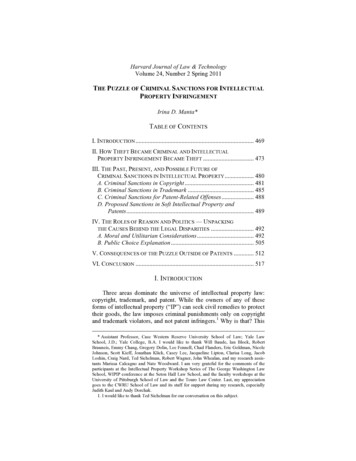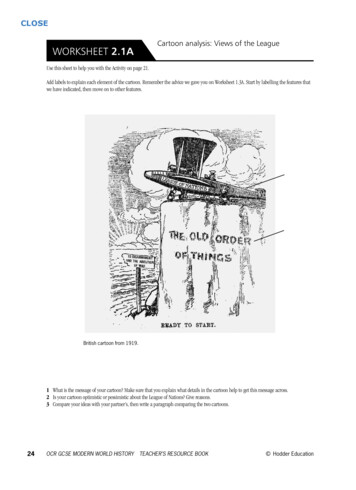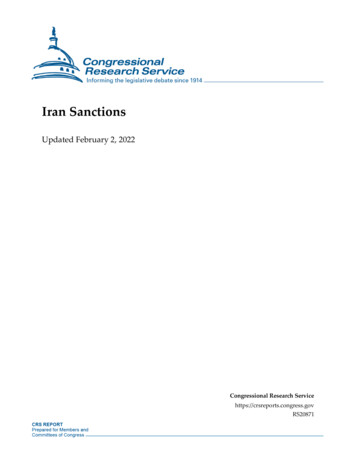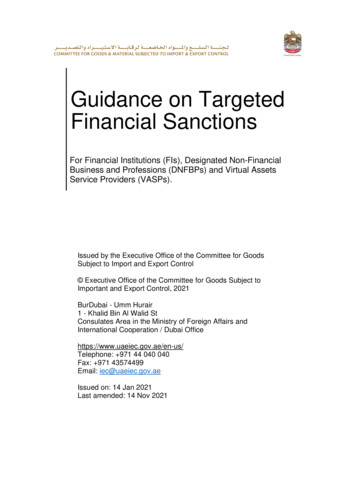
Transcription
Guidance on TargetedFinancial SanctionsFor Financial Institutions (FIs), Designated Non-FinancialBusiness and Professions (DNFBPs) and Virtual AssetsService Providers (VASPs).Issued by the Executive Office of the Committee for GoodsSubject to Import and Export Control Executive Office of the Committee for Goods Subject toImportant and Export Control, 2021BurDubai - Umm Hurair1 - Khalid Bin Al Walid StConsulates Area in the Ministry of Foreign Affairs andInternational Cooperation / Dubai Officehttps://www.uaeiec.gov.ae/en-us/Telephone: 971 44 040 040Fax: 971 43574499Email: iec@uaeiec.gov.aeIssued on: 14 Jan 2021Last amended: 14 Nov 2021
AcronymsDNFBPsExecutive Office or EOFATFDesignated non-financial businesses and professionsThe Executive Office of the Committee for Goods & Material Subjected to Import & ExportControlFinancial Action Task ForceFIsFinancial InstitutionsFIUFinancial Intelligence UnitLocal Terrorist ListMOFAICOther MeasuresPersonSanctions ListsSTR/SARSupervisory AuthoritiesSupreme CouncilNational terrorist list issued by the UAE CabinetMinistry of Foreign Affairs and International CooperationOther sanctions measures besides freezing. These may include travel bans, armsembargoes, export ban, etc.Natural and legal personLocal Terrorist List and UN Consolidated ListSuspicious Transaction Report / Suspicious Activity ReportFederal and local authorities which are entrusted by legislation to supervise FIs, DNFBPs,VASPs and non-profit organisations or the competent authority in charge of approving thepursuit of an activity or a profession in case a supervisory authority is not assigned bylegislation.Supreme Council for National SecurityTFSTargeted Financial SanctionsUAEUnited Arab EmiratesUNUN Consolidated ListUNSCUNSC Sanctions CommitteeUNSCRVASPsUnited NationsUnited Nations Security Council Consolidated List pursuant to the relevant United NationsSecurity Council Resolutions.United Nations Security CouncilUnited Nations Security Council Sanction Committee that oversees the compliance of UnitedNations Security Council Resolutions. Please note that all current United Nations sanctionsregimes have their own Sanctions Committee.United Nations Security Council ResolutionVirtual Assets Service Providers1
ContentsAcronyms . 1Overview of Targeted Financial Sanctions . 3Section 1: Legal Framework . 4Section 2: What are TFS? . 4How long do these measures last? . 5Section 3: What is the Purpose of TFS? . 5Where to find the updated Sanctions Lists? . 7Who is the target of these measures? . 7What does 'funds or other assets' mean? . 7Section 4: Obligations on FIs, DNFBPs, and VASPs to Implement TFS . 9Step 1 – Subscribe . 9TFS Survey Feature . 9Step 2 – Screen. 10Step 3 – Apply Targeted Financial Sanctions . 11Step 4 – Report . 12Reporting TFS measures through GoAML . 12Reporting TFS by Email . 15Reporting STRs / SARs . 16Additional Obligations for FIs, DNFBPs, and VASPs . 17Section 5: Ownership, Control, and Acting on Behalf or at the Direction of . 17Majority Interest . 17Minority Interest . 18Control. 19Acting on Behalf or at the Direction of . 20Section 6: Enforcement of TFS . 21Consequences for FIs, DNFBPs, and VASPs . 21Exemption from Liability in Case of Good Faith TFS Implementation . 22Section 7: Requesting an Exemption or Permission to Access Frozen Funds or Other Assets . 22Frozen Funds or Other Assets due to the Local Terrorist List . 22Frozen Funds or Other Assets due to the UN Consolidated List . 23Section 8: Procedure to Cancel or Lift the Freezing Measures . 26Frozen Funds or Other Assets due to the Local Terrorist List . 26Frozen Funds or Other Assets due to the UN Consolidated List . 27Section 9: Requesting the Removal or De-listing of a Designation from the Local Terrorist List . 28Section 10: Requesting the Removal or De-listing of a Designation from the UN List . 29Contact us . 29Annex A: Frequency Asked Questions . 30Annex B: EO Notification / Alert System Subscription Guide . 37Document Version Update . 412
Overview of Targeted Financial SanctionsThe United Nations Security Council (UNSC) is one of the six principal organs of the United Nations(UN) and has primary responsibility for the maintenance of international peace and security. It has 15Members, and each member has one vote. Under the Charter of the United Nations, all Member Statesof the UN are obligated to comply with the Security Council decisions.The UNSC holds the capacity to take action seeking to maintain or restore international peace andsecurity under Article 41 of Chapter VII of the Charter of the United Nations by imposing sanctioningmeasures. These measures encompass a broad range of enforcement options that do not involve theauthorisation of the use of armed force, including interruption of economic relations, internationalcommunications, and diplomatic relations.The Security Council sanctions regimes focus mainly on supporting the settlement of political conflicts,nuclear non-proliferation, and counterterrorism. These regimes include measures ranging fromcomprehensive economic and trade sanctions to more targeted measures such as arms embargoes,travel bans, and restrictions on dealing with certain financial or commodity transactions.In addition, the Financial Action Task Force (FATF), an inter-governmental body responsible for settinginternational standards on anti-money laundering (AML) and countering the financing of terrorism (CFT)and proliferation (CPF), under Recommendations 6 and 7 (R6/R7) of the FATF Standards, requires theimplementation of targeted financial sanctions (TFS) to comply with the UN Security CouncilResolutions (UNSCRs) relating to the prevention and suppression of terrorism, terrorism financing, andproliferation financing.The United Arab Emirates (UAE), as a member of the United Nations, is committed to implementingUNSCRs, including those related to the UN’s sanctions regimes. Consequently, through the CabinetDecision No. 74 of 2020, the UAE is implementing relevant UNSCRs on the suppression and combatingof terrorism, terrorist financing and countering the financing of proliferation of weapons of massdestruction, in particular relating to TFS. Persons should note that, in accordance with the laws of theUAE, the UAE Government also applies TFS by publishing a Local Terrorist List in accordance withUNSCR 1373 (2001).The term TFS refers to asset freezing and other financial prohibitions, agreed upon by the UNSC, toprevent funds or other assets from being made available, directly or indirectly, for the benefit ofdesignated individuals, entities, or groups.This guidance is therefore focused on the procedures to implement local and UN sanctions by allPersons (natural and legal) in the UAE. Financial Institutions (FIs), Designated Non-FinancialBusinesses and Professions (DNFBPs), and Virtual Assets Service Providers (VASPs) are obliged, byUAE law, to apply policies, procedures and controls to implement TFS to those sanctioned anddesignated in the Local Terrorist List and UN Consolidated List (Sanctions Lists).3
Section 1: Legal FrameworkThe following list comprises the relevant federal law and executive regulations issued so far for thepurpose of implementing local and UN sanctions in the UAE.TitleArticles/TextFederal Decree No. 26 of 2021 Amending CertainProvisions of Law No. 20 for 2018 on Anti-MoneyLaundering and Countering the Financing ofTerrorism16.1(e), 28Cabinet Decision No. 10 of 2019 Concerning theImplementing Regulation of Decree Federal LawNo. 20 of 2018 on Anti-Money Laundering andCombating the Financing of Terrorism and IllegalOrganizations7, 11, 12, 44.7, 60Cabinet Decision No. 74 of 2020 concerning theLocal Terrorist List of terrorists and implementationof UN Security Council decisions relating topreventing and countering financing terrorism andleveraging non-proliferation of weapons of massdestruction, and the relevant resolutions.IssuedTypeIssued: 2018Federal LawAmended: The whole textSection 2: What are TFS?The term targeted financial sanctions includes both asset freezing without delay and prohibition frommaking funds or other assets or services, directly or indirectly, available for the benefit of sanctionedindividuals, entities, or groups. Asset freezing without delay: Freezing is the prohibition to transfer, convert, dispose, or moveany funds or other assets that are owned or controlled by designated individuals, entities, orgroups in the Local Terrorist List or UN Consolidated List. It includes:oThe freezing of funds and other financial assets and economic resources, and includespreventing their use, alteration, movement, transfer, or access.4
oThe freezing of economic resources also includes preventing their use to obtain fundsor other assets or services in any way, including, but not limited to, by selling ormortgaging them.Example: FIs: a freezing measure can be suspending access to bank accounts or blockingtransactions. DNFBPs: a freezing measure can be stopping the facilitation of or blocking the transferof ownership of immovable or movable assets. VASPs: a freezing measure can be blocking services to trade and transfer virtualassets. Prohibition from making funds or other assets or services available: This means theprohibition to provide funds or other assets to or render financial or other services to, anydesignated individual, entity, or group.Example: FIs: offering banking or transactional services. DNFBPs: the provision of any services, such as legal services to transfer assetownership, buying or selling real estate, selling jewellery, precious metals, naturalresources, etc. VASPs: the provision of any services, including but not limited to trading andtransferring virtual assets.How long do these measures last?Asset freezing and prohibition measures have no time limit: the funds or other assets should remainfrozen, and the prohibition from making funds or other assets or services available remains until theindividual, entity, or group is removed from the Local Terrorist List or the UN Consolidated List or untilthere is a freezing cancellation decision made by a competent authority or the UNSC.Section 3: What is the Purpose of TFS?The purpose of TFS is to deny certain individuals, entities, or groups the means to violate internationalpeace and security, support terrorism or finance the proliferation of weapons of mass destruction. Toachieve this, it seeks to ensure that no funds or other assets or services of any kind are made availableto designated persons for so long as they remain subject to the targeted financial sanctions measures.TFS are implemented in the UAE pursuant to UNSCRs in relation to:a) Terrorism and terrorist financing:5
1. Islamic State in Iraq and the Levant (Da'esh), Al-Qaida,and associated individuals, groups, undertakings andentities.UNSCR 1267 (1999), 1989(2011) and its successorresolutions2. The Taliban, and associated individuals, groups,undertakings, and entities.UNSCR 1988 (2011) and itssuccessor resolutions3. Any individual or entity included in the Local Terrorist List,pursuant to UNSCR 1373 (2001)UNSCR 1373 (2001)b) The proliferation of weapons of mass destruction (WMD):1. Democratic People's Republic of Korea (DPRK): nuclearrelated, other weapons of mass destruction-related andballistic missile-related programmes.UNSCR 1718 (2006) and itssuccessor resolutions2. Islamic Republic of Iran: nuclear programmeUNSCR 2231 (2015)c) Other UN sanctions regimes with TFS:1. SomaliaUNSCR 1844(2008)2. IraqUNSCR 1483(2003)3. Democratic Republic of Congo (DRC)4. Related to the involvement of terrorist bombing in Beirut (2005) plusrestrictive measures in relation to UNSCR 1701 (2006) on LebanonUNSCR 1596(2005) &UNSCR 1807UNSCR 1636(2005) &UNSCR 1701(2006)5. LibyaUNSCR 1970(2011)6. Central African Republic (CAR)UNSCR 2127(2013)7. South SudanUNSCR 2140(2014)8. MaliUNSCR 2206(2015)9. YemenUNSCR 2374(2017)FIs, DNFBPs, and VASPs should note that TFS restrictions published in the Local Terrorist List and UNConsolidated List are subject to change. It is the obligation of all FIs, DNFBPs, and VASPs to ensure6
relevant controls and procedures are in place to maintain relevant and up-to-date controls in order toeffectively implement TFS restrictions.Where to find the updated Sanctions Lists?The information on designated individuals, entities, or groups in the Sanctions Lists is subject to change.The most recently updated information can be found in the following links: The UAE has a Local Terrorist List of all the sanctioned individuals, entities, or groupsdesignated by the UAE Cabinet. The link to the Local Terrorist List can be found at the bottomof the Local Terrorist List webpage on the Executive Office’s website:https://www.uaeiec.gov.ae/en-us/un-page# The UNSC has a UN Consolidated List of all the sanctioned individuals, entities, or groupsdesignated by the United Nations Sanctions Committees or directly by the UNSC. This link canbe found on: onsolidated-listWho is the target of these measures?The freezing measures, including the prohibition of making funds or other assets or services available,apply to:a) Any individual, entity, or group designated in the Local Terrorist List issued by the FederalCabinet or designated by the UNSC in the UN Consolidated List.b) Any entity, directly or indirectly owned or controlled by an individual, entity, or group designatedunder A.c) Any individual or entity acting on behalf of or at the direction of any individual, entity, or groupdesignated under A & B.In cases where an asset is owned or controlled in part or in full by a designated individual, entity, orgroup and such asset continues to produce benefit, for example in the form of dividends or interest, therelevant portion of such benefit is also subject to freezing measures.What does 'funds or other assets' mean?Funds or other assets: The term funds or other assets means any assets, including, but not limitedto, financial assets, economic resources (including oil and other natural resources), property of everykind, whether tangible or intangible, movable or immovable, however acquired, and legal documents orinstruments in any form, including electronic or digital, evidencing title to, or interest in, such funds orother assets, including, but not limited to, bank credits, travellers cheques, bank cheques, moneyorders, shares, securities, bonds, drafts, or letters of credit, and any interest, dividends or other incomeon or value accruing from or generated by such funds or other assets, and any other assets whichpotentially may be used to obtain funds, goods or services.Categories of funds: All types of funds or other assets are subject to freezing measures. The funds orother assets can be categorised into the following types:1. Funds and Other Financial Assets7
Funds and other financial assets subject to sanctions are, for example, the following:a. Cash, cheques, claims on money, drafts, money orders, bearer instruments, internet-basedand other electronic or digital payment instruments, including virtual currencies.b. Deposits with FIs or other entities and balances on accounts, including but not limited to: (1)fixed or term deposit accounts, (2) balances on share trading accounts with banks, brokeragefirms, or other investment trading accounts.c.Debts and debt obligations, including trade debts.d. Other accounts receivable, notes receivable, and other claims of money on others.e. Equity and other financial interest in a sole trader or partnership.f.Publicly and privately traded securities and debt instruments, including stocks and shares,certificates representing securities, bonds, notes, warrants, debentures, and derivativescontracts.g. Interest, dividends, or other income on or value accruing from or generated by assets.h. Credit, right of set-off, guarantees, performance bonds or other financial commitments.i.Letters of credit, bills of lading, bills of sale; notes receivable and other documents evidencingan interest in funds or financial resources and any other instruments of export-financing.j.Insurance and reinsurance.2. Economic ResourcesEconomic resources subject to sanctions include assets of any kind, whether tangible or intangible,movable, or immovable, actual, or potential, which potentially may be used to obtain funds, goods, orservices, such as:a. Land, buildings, or other real estate.b. Equipment, including computers, computer software, tools, and machinery.c.Office furniture, fittings and fixtures and other items of a fixed nature.d. Vessels, aircraft, and motor vehicles.e. Inventories of goods.f.Works of art, cultural property, precious stones, jewelry, or gold.g. Commodities, including oil, minerals, or timber.h. Arms and related material, including all items mentioned in the arms embargo, included but notlimited to weapons and ammunition, military vehicles and equipment, paramilitary equipment,and spare parts for the aforementioned, and technical advice, assistance, or training related tomilitary activities.i.Raw materials and components that can be used to manufacture improvised explosive devicesor unconventional weapons, including but not limited to chemical components, detonating cord,or poisons.8
j.Patents, trademarks, copyrights, trade names, franchises, goodwill, and other forms ofintellectual property; internet hosting or related services.k.Any other assets.Section 4: Obligations on FIs, DNFBPs, and VASPs toImplement TFSAll FIs, DNFBPs, and VASPs must:Step 1Step 2Step 3Step 4SubscribeScreenApply TFSReportStep 1 – SubscribeFIs, DNFBPs, and VASPs are required to subscribe to the Executive Office of the Committee forGoods & Material Subjected to Import and Export Control’s (Executive Office or EO) NotificationSystem on the Executive Office’s website to receive automated email notifications on any updatesto the Sanctions Lists: https://www.uaeiec.gov.ae/en-us/un-pageThis registration is aimed to help FIs, DNFBPs, and VASPs to receive updated and timelyinformation about the designation and de-listing of individuals, entities, or groups in the SanctionsLists.For guidance on how to subscribe, refer to “Annex B: EO Notification System Subscription Guide”.TFS Survey FeatureThe EO Notification System has been enhanced to include a TFS survey feature which provides astep-by-step guide for FIs, DNFBPs, and VASPs on their obligation to implement TFS as per CabinetDecision No. 74 of 2020, including screening, freezing, and reporting. FIs, DNFBPs, and VASPs areencouraged to fill out the survey whenever a designation update is received.TFS Survey in Email Received from EO Notification System9
Step 2 – ScreenFIs, DNFBPs, and VASPs must undertake regular and ongoing screening on the latest Local TerroristList and UN Consolidated List. Screening must be undertaken in the following:a. Upon any updates to the Local Terrorist List or UN Consolidated List. In such cases, screeningmust be conducted immediately and without delay to ensure compliance with implementingfreezing measures without delay (within 24 hours).b. Prior to onboarding new customers.c. Upon KYC reviews or changes to a customer’s information.d. Before processing any transaction.FIs, DNFBPs, and VASPs are also required to identify, assess, monitor, manage and mitigate terroristand proliferation financing risks, particularly sanctions-related risks. The internal screening processmust take into account such a risk assessment. Where there are higher risks, FIs, DNFBPs, andVASPs should take commensurate measures to manage and mitigate the risks, including applyingenhanced screening measures. Correspondingly, where the risks are lower, they should ensure thatthe screening measures are commensurate with the lower level of risk. FIs, DNFBPs, and VASPsmust ensure full implementation of targeted financial sanctions in any risk scenario.The following databases must be included in the screening process:a. Existing customer databases. All systems containing customer data and transactions need tobe mapped to the screening system to ensure full compliance.b. Potential customers before conducting any transactions or entering a business relationship withany Person.c. Names of parties to any transactions (e.g., buyer, seller, agent, freight forwarder, etc.)d. Ultimate beneficial owners, both natural and legal.e. Names of individuals, entities, or groups with direct or indirect relationships with them.f. Directors and/or agents acting on behalf of customers (including individuals with power ofattorney).Sanctions Lists contain a range of information to aid the identification of designated individuals, entities,or groups. The following are examples of the identifiers in the Sanctions Lists:For natural person NameAliasesDate of birthNationalityID or passport informationLast known addressPotentialmatchFor legal persons Name(s)AliasesAdddress of registrationAddress of branchesOther informationA potential match is when there is a partialmatch between identifiers in the Sanctions Listswith any information in your databases, and youare unable to conclude a false positive or aconfirmed match.Example: Your customer’s name andDOB match with the identifiers of adesignated person in the Sanctions Lists,but the nationality is different and there isa slight difference in the name spelling.10
ConfirmedmatchA confirmed match is when an individual, entity,or group matches all of the key identifierspublished on the Sanctions Lists.False positiveresultA false positive is a potential match to listedindividuals, entities, or groups, either due to thecommon nature of the name or due toambiguous identifying data, which onexamination proves not to be a confirmedmatch.Example: Your customer’s name,nationality, and DOB fully match with theidentifiers of a designated person in theSanctions Lists, but the registeredaddress is different.Example: Your customer’s namematches with a designated person whois 40 years old according to the DOBidentifier in the Sanctions Lists, but yourcustomer is a 16-year-old high schoolstudent.Because many names are very common, you may find various potential matches. However, it does notnecessarily mean that the individual, entity, or group you are dealing with is subject to TFS.When identifying the potential match, by taking into consideration the knowledge you have of thecustomer, potential customer, beneficial owner, or transaction, through the customer due diligenceand/or using reasonable information (e.g., open-source information, media articles, commercialdatabases, etc.), you must cross-check your customer’s data with the identifiers published on theSanctions Lists. If you are satisfied that the individual, entity, or group is not the designated individual,entity, or group, i.e. a ‘False Positive Result’, then you do not need to implement any TFS measures.You may allow the transaction or business to continue its normal course, and you are required tomaintain evidence of this process in your records.If you are unable to internally verify whether the ‘potential match’ is a false positive result or aconfirmed match, then you must suspend any transaction and report the case to the Executive Officeand the relevant Supervisory Authority and uphold the suspension measures until a response isreceived from the Executive Office on the status of the potential match (whether false positive orconfirmed match). Reporting procedures on suspension measures due to potential matches are furtherexplained in “Step 4 – Report”.If the individual, entity, or group matches all of the key identifiers published on the Sanctions Lists, thenthe result is considered a ‘confirmed match’. In case the confirmed match is an existing customer, youmust freeze without delay, refrain from offering any funds or other assets or services and report thefreezing measures to the Executive Office and the relevant Supervisory Authority within five businessdays from taking any freezing measure and/or attempted transactions. In case the confirmed match isa potential customer, you must reject the transaction immediately and report the case. Reportingprocedures on freezing measures due to confirmed match are further explained in “Step 4 – Report”.Step 3 – Apply Targeted Financial SanctionsThe following are the TFS measures that must be implemented if a match with the Local TerroristList or UN Consolidated List is identified.I.Freeze all funds or other assets without delay: freeze without delay (immediately or inany case within 24 hours) and without prior notice to the designated individual, entity, orgroup, all the funds or other assets:a. Owned or controlled, wholly or jointly, directly, or indirectly, by an individual, entity, orgroup designated in the Local Terrorist List or the UN Consolidated List.11
b. Derived or generated from funds or other assets under item (a); orc.Any individual or entity acting on behalf of or at the direction of any designatedindividual, entity, or group.The obligations to freeze without delay shall not prevent additions to frozen accounts of: interest, profits, or other earnings due on the account; or of payments due under contracts, agreements or obligations agreed upon prior to the date onwhich the account has become subject to freezing, provided such additions are immediatelyfrozen.II.Prohibition of making funds or other assets or services available: FIs, DNFBPs, andVASPs in the UAE are prohibited from providing funds or other assets to or renderingfinancial services or other services related to, whether in whole or in par
destruction, in particular relating to TFS. Persons should note that, in accordance with the laws of the UAE, the UAE Government also applies TFS by publishing a Local Terrorist List in accordance with UNSCR 1373 (2001). The term TFS refers to asset freezing and other financial prohibitions, agreed upon by the UNSC, to
